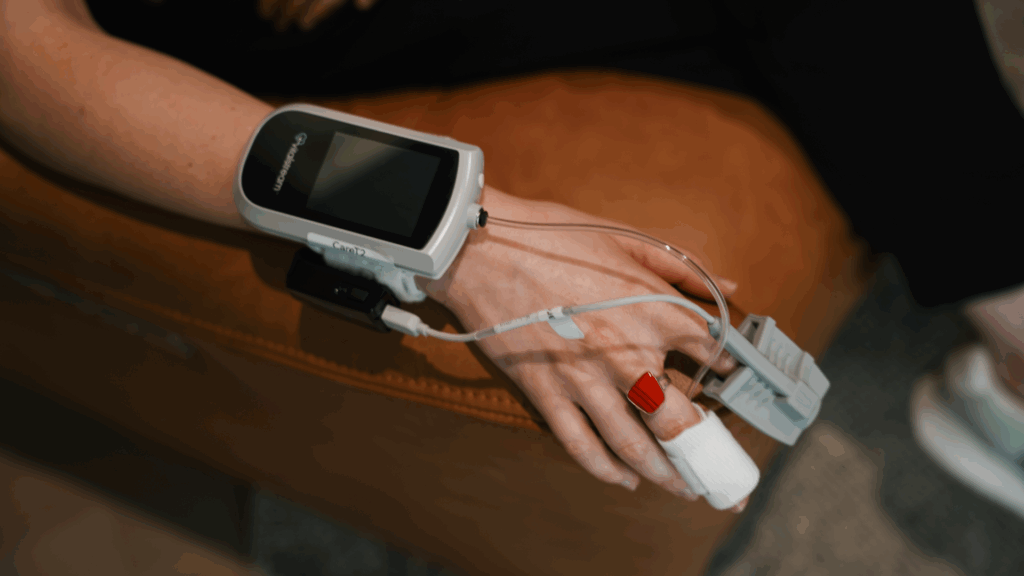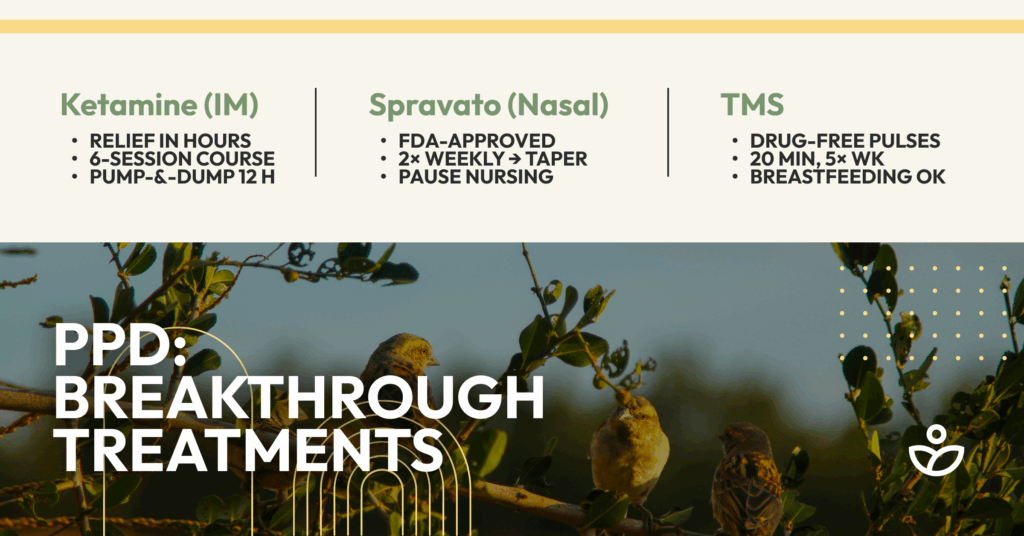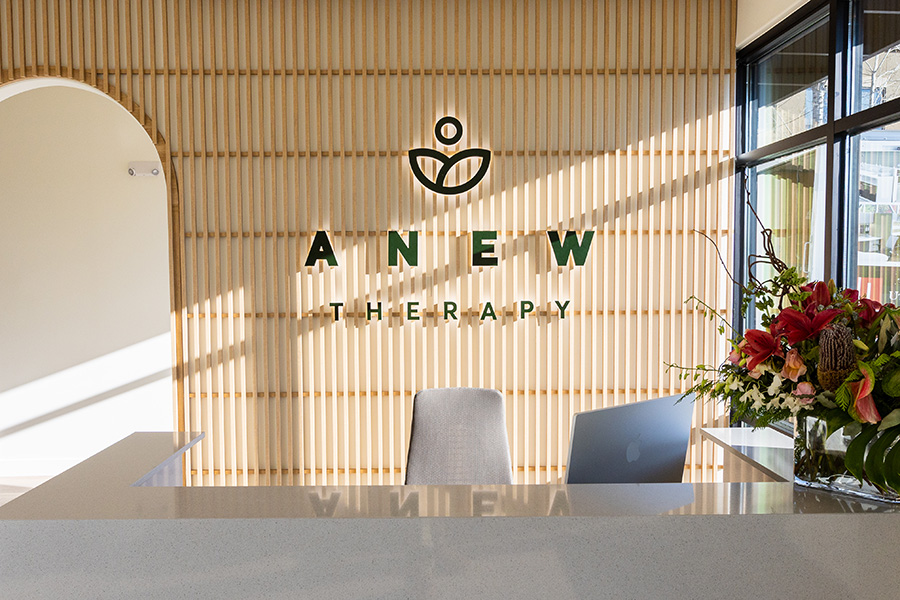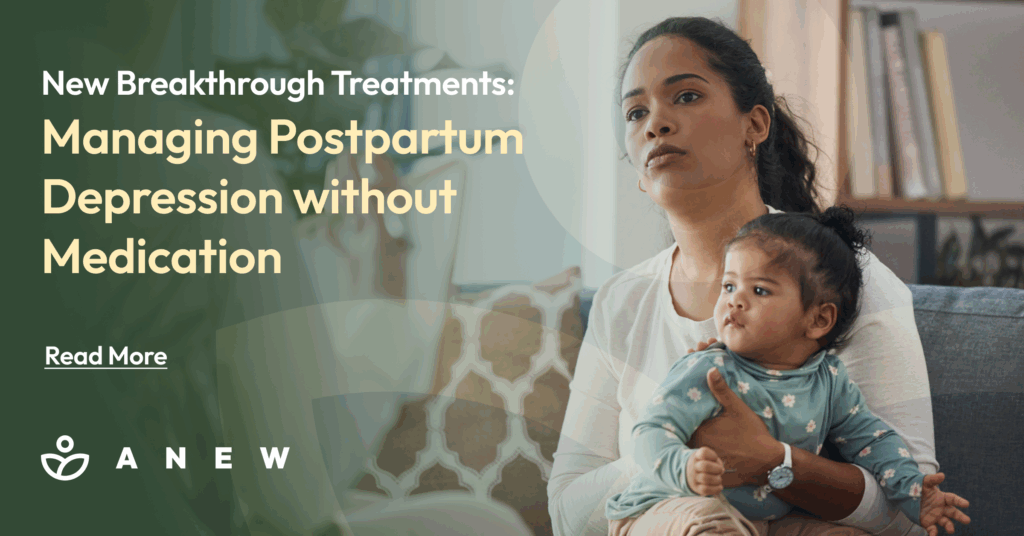Postpartum depression (PPD) affects approximately 1 in 7 new mothers, often surfacing during a time meant for joy, bonding, and new beginnings. For many women, however, traditional antidepressants fall short—taking weeks to work, causing unwanted side effects, or interfering with breastfeeding. As a result, the search for faster, safer, and more effective options has become increasingly important. Today, several cutting-edge approaches are reshaping how we treat postpartum depression without medication.
Among the most promising breakthrough therapies are:
- Ketamine therapy: Delivers fast mood improvement via controlled injections, often within hours or days.
- Spravato (esketamine nasal spray): FDA-approved and effective for rapid symptom relief in treatment-resistant cases.
- Transcranial Magnetic Stimulation (TMS): A non-invasive, drug-free brain stimulation technique proven to reduce depressive symptoms.
These innovative treatments offer hope for mothers seeking quick, lasting relief—without the delay or drawbacks of conventional medication. When combined with holistic support such as talk therapy, they form a powerful foundation for healing and restoring balance in the postpartum journey.
Ketamine Therapy
Ketamine, originally used as an anesthetic, has sparked interest for its rapid antidepressant effects. Administered in sub‑anesthetic doses via either intramuscular injections or IV infusions, it works on NMDA receptors—triggering neuroplasticity and mood improvement within hours to days
How it works & administration:
Women receive low-dose intramuscular ketamine injections under clinical supervision (typically around 0.5 mg/kg). These treatments are delivered as part of a structured course, often six sessions over 4–6 weeks, to support sustained improvement. Many report significant mood improvement within hours, with antidepressant effects often lasting several days to a week following a single injection.

Supporting evidence:
Studies have demonstrated rapid relief in treatment‑resistant depression, and emerging PPD data shows promise. A low‑dose injection of esketamine after childbirth reduced major depressive episodes by ~75% at 42 days postpartum. While larger trials are ongoing, early findings suggest ketamine may even prevent PPD when given immediately after birth.
Considerations:
Ketamine is administered under close medical supervision because its brief side effects—such as dissociation or mild sedation—can temporarily impair alertness. It is contraindicated for individuals with significant cardiovascular or liver disease or active psychotic disorders. Current pharmacokinetic data show that ketamine passes into breast milk only in very small amounts and has low oral bioavailability, indicating minimal risk to nursing infants; nevertheless, providers typically recommend pumping and discarding breast milk for the first 8-12 hours after an injection and monitoring the baby for unusual sleepiness or poor feeding.
For safety, patients must arrange transportation home after each session, as driving themselves is not permitted.
Spravato (Esketamine Nasal Spray)
Spravato is an FDA‑approved esketamine nasal spray for treatment‑resistant depression, with growing use in PPD care.
Mechanism & delivery:
Administered nasally under medical supervision, Spravato targets glutamate receptors, promoting rapid synaptic growth. Effects can be felt within 24–48 hours.
Supporting evidence:
A controlled trial involving 364 women with prenatal depression found that a single post‑birth esketamine infusion reduced incidence of major PPD episodes by 74% at 42 days.
Considerations:
Sessions typically begin twice weekly and taper over time. Most major insurers cover Spravato for PPD. Side effects—such as mild dissociation or dizziness—are short-lived, with no long-term safety concerns when used in supervised settings. After each administration, patients are required to remain in the clinic for at least two hours for observation, and because of temporary effects on alertness, they must arrange for someone to drive them home.
Because infant-safety data on esketamine are still limited, Anew Therapy’s clinicians coordinate closely with your OB-GYN and pediatrician to determine whether nursing should be paused during treatment.
TMS (Transcranial Magnetic Stimulation)
TMS provides a medication-free option for postpartum depression, ideal for mothers who want to avoid systemic drugs while still getting meaningful relief.
What it involves:
In each session, a small coil sends gentle magnetic pulses to the front part of the brain that controls mood. Treatments take about 20–30 minutes and are scheduled four or five days a week for roughly eight weeks. After an initial visit that pinpoints the right spot to treat, the routine is quick and consistent, and most moms drive themselves home afterward. Many women feel lighter and sleep better within two to three weeks of starting treatment.
Research insights:
Studies report TMS reduces EPDS depression scores by 43–60%, with remission rates reaching 50–75% that persist for months. Crucially, it avoids systemic side effects and does not affect breast milk or breastfeeding capability.
Advantages vs. medication:
Because stimulation stays local to the head, it avoids whole-body side effects like weight gain, grogginess, or breastfeeding concerns. The most common issues—mild scalp tingling or a brief headache—fade quickly and rarely interfere with daily life.

Why Speed and Safety Matter in Postpartum Depression
Quick relief profoundly affects recovery. Prolonged PPD can disrupt mother–infant bonding and increase risks for chronic depression or suicidal ideation—which remains one of the leading causes of maternal mortality within the first year postpartum. Rapid‑acting treatments bridge those critical moments, offering support and stabilization.
Complementary Holistic Support
While these breakthrough therapies can significantly reduce symptoms, combining them with traditional care enhances outcomes:
- Psychotherapy: CBT and IPT effectively reshape thought patterns and strengthen maternal bonds.
- Nutrition & lifestyle: Mediterranean diet, omega-3s, vitamin D, consistent gentle exercise (30 minutes, 3x/week) support recovery and mood.
- Social support: Peer groups, postpartum doulas, and moderated online communities help reduce isolation and improve coping.
At Anew Therapy in Utah, mothers receive comprehensive care—integrating ketamine/Spravato/TMS with lifestyle coaching and ongoing support.
Anew Therapy in Utah: Leading the Way in PPD Care
Postpartum depression is not a sign of weakness—it’s a medical condition that deserves swift, expert care. For Utah mothers, Anew Therapy is a premiere center offering advanced treatments that go beyond traditional approaches. With specialized, medication-free PPD care such as ketamine therapy, Spravato nasal spray, and TMS, Anew Therapy is transforming how postpartum depression is treated—and how quickly mothers can reclaim their wellbeing.
At Anew Therapy, you’ll receive:
- Comprehensive Evaluations: Using clinical tools like the Edinburgh Postnatal Depression Scale (EPDS), plus personalized intake that respects your lifestyle, breastfeeding goals, and emotional needs.
- Rapid Relief Treatments: Ketamine injections, Spravato sessions, or TMS are offered in a safe, supportive setting under experienced medical supervision.
- Whole-Person Healing: Integrated therapy, nutritional coaching, and stress management support to create lasting transformation.
- Ongoing Support: Continued monitoring and relapse prevention strategies ensure your recovery is strong and sustainable.
- Flexible, Accessible Care: With most major insurance accepted, and scheduling that works around a newborn’s needs, treatment is never out of reach.
Whether you’re facing PPD for the first time or haven’t found relief through medication alone, know this: You are not alone—and fast, effective help is within reach.
If you’re in Utah, let Anew Therapy be your guide to recovery. Schedule your free consultation today and take your first step toward reclaiming joy, balance, and connection during the postpartum journey.

Are you a Utah mother struggling with postpartum depression? Anew Therapy offers expert care and safe, proven results. Schedule your free evaluation today.

